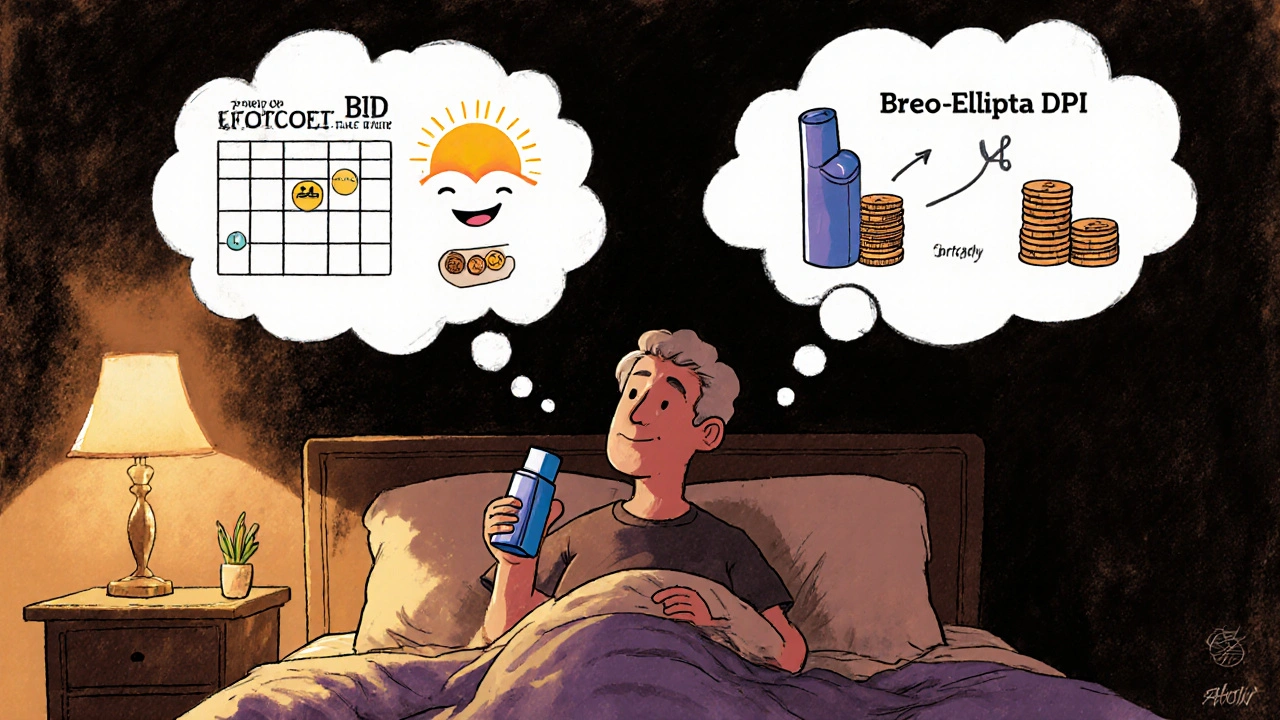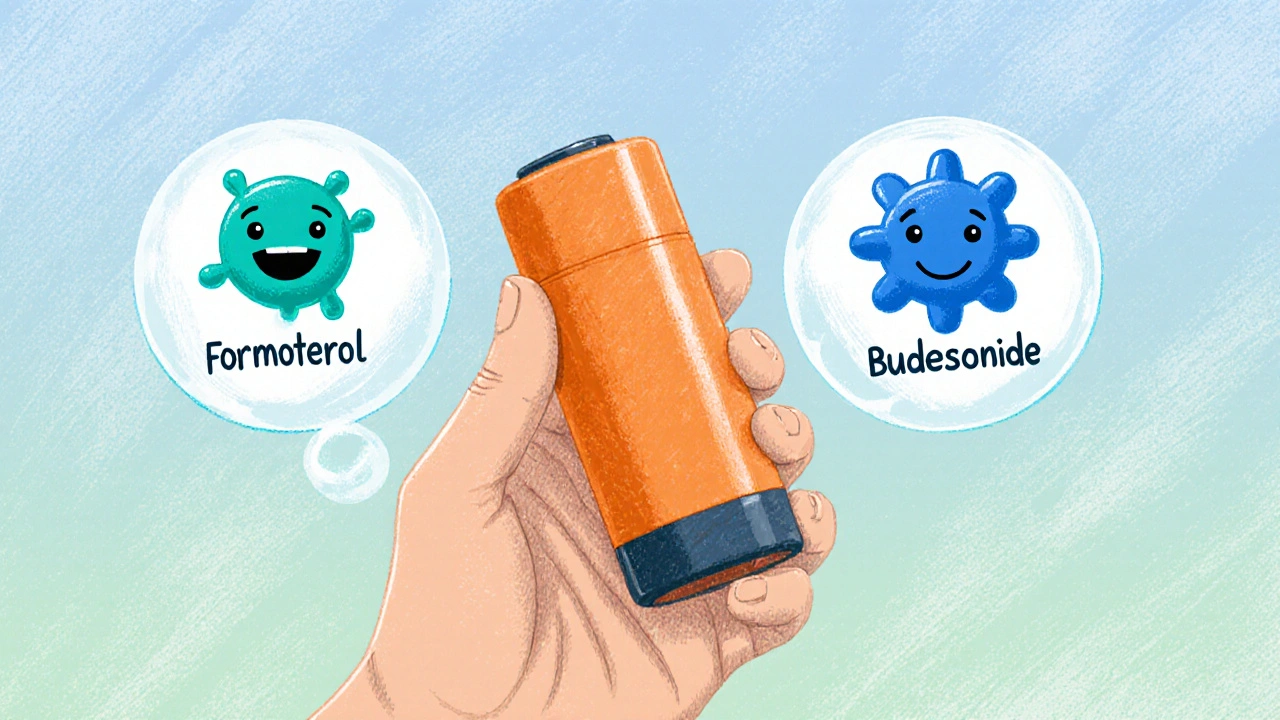Inhaler Comparison Tool
Filter Your Options
Your Matched Alternatives
Select filters to see matched inhalers
If you’ve been prescribed Foracort inhaler and are wondering how it stacks up against other options on the market, you’re not alone. With dozens of combo inhalers available, choosing the right one can feel overwhelming. This guide breaks down the key differences, helping you decide whether Foracort is the right fit or if an alternative might serve you better.
What is Foracort Inhaler?
Foracort is a fixed‑dose combination inhaler that pairs the long‑acting β2‑agonist (LABA) Formoterol with the inhaled corticosteroid (ICS) Budesonide. It is delivered via a press‑urged metered‑dose device, typically prescribed for moderate to severe asthma and chronic obstructive pulmonary disease (COPD).
Key Ingredients Explained
Formoterol is a LABA that relaxes airway smooth muscle, providing bronchodilation for up to 12 hours. Its rapid onset (within minutes) makes it useful for both maintenance and quick relief. Budesonide is an inhaled corticosteroid that reduces airway inflammation, decreasing the frequency of asthma attacks over long‑term use.
How Do We Compare Inhalers?
When weighing Foracort against its competitors, consider these six criteria:
- Active ingredients: LABA/ICS pairing, potency, and dose.
- Device type: metered‑dose inhaler (MDI), dry‑powder inhaler (DPI), or soft‑mist inhaler.
- Dosage flexibility: ability to adjust doses for symptom control.
- Cost & insurance coverage: average retail price in the U.S. and typical co‑pay.
- Side‑effect profile: risk of oral thrush, hoarseness, or systemic steroid effects.
- Regulatory approvals: FDA labeling for asthma, COPD, or both.
Top Alternatives to Foracort
Below are the most frequently prescribed combo inhalers that compete directly with Foracort.
| Brand | Active Ingredients | Device Type | Typical Daily Dose | Average U.S. Price* (30‑day supply) | Common Side Effects |
|---|---|---|---|---|---|
| Foracort | Formoterol + Budesonide | MDI | 200 µg Formoterol / 200 µg Budesonide BID | $55 | Thrush, hoarseness, tachycardia |
| Symbicort (budesonide/formoterol) | Budesonide + Formoterol | MDI | 200 µg Formoterol / 160 µg Budesonide BID | $58 | Oral thrush, cough, palpitations |
| Advair (fluticasone/salmeterol) | Fluticasone + Salmeterol | MDI | 250 µg Salmeterol / 100‑500 µg Fluticasone BID | $70 | Hoarseness, oral candidiasis, tremor |
| Breo Ellipta (fluticasone/vilanterol) | Fluticasone + Vilanterol | DPI | 100 µg Vilanterol / 100‑200 µg Fluticasone QD | $85 | Thrush, headache, increased heart rate |
| Pulmicort (budesonide alone) | Budesonide (ICS only) | MDI | 200‑400 µg QID (as needed) | $38 | Oral thrush, cough, dysphonia |
*Prices are approximate retail costs in 2025 and may vary by pharmacy and insurance plan.
When Foracort Might Be Your Best Choice
Foracort shines in three scenarios:
- Rapid symptom relief plus maintenance: Formoterol’s quick onset lets you treat sudden breathlessness without a separate rescue inhaler.
- Convenient twice‑daily dosing: The BID schedule aligns with many patients’ morning/evening routines, boosting adherence.
- Cost‑effectiveness: Compared with newer DPIs like Breo Ellipta, the MDI version stays under $60 for a month’s supply.

When an Alternative May Outperform Foracort
Consider switching if you encounter any of these issues:
- Device preference: Some patients struggle with the coordination required for MDIs and prefer the breath‑actuated DPI format of Breo Ellipta.
- Higher steroid dose needed: Advair offers a broader range of fluticasone doses, useful for severe asthma that requires >500 µg of corticosteroid daily.
- Once‑daily convenience: If remembering a BID inhaler is tough, once‑daily options like Breo Ellipta reduce dosing fatigue.
How to Switch Safely Between Inhalers
Changing from Foracort to another combo inhaler should be done under medical supervision. Follow these steps:
- Consult your pulmonologist or primary‑care provider to confirm the new inhaler matches your disease severity.
- Obtain a written action plan that outlines dosages, timing, and rescue inhaler use.
- Practice the new device technique in the clinic; improper inhalation can reduce drug delivery by up to 30 %.
- Maintain a short overlap period (usually 1‑3 days) only if your physician advises, to avoid a gap in therapy.
- Rinse your mouth after each dose to lower the risk of oral thrush.
Frequently Asked Questions
Is Foracort suitable for children?
Foracort is FDA‑approved for patients 12 years and older. For younger children, pediatric‑specific formulations like Pulmicort Respules are usually recommended.
Can I use a rescue inhaler with Foracort?
Yes. Because Formoterol provides both maintenance and quick‑relief, many clinicians still prescribe a short‑acting β2‑agonist (SABA) like albuterol for breakthrough symptoms.
What are the most common side effects?
Mouth‑thrush, hoarse voice, and occasional fast heart rate are the top complaints. Rinsing your mouth and using the lowest effective dose reduces these risks.
How does Foracort compare to Symbicort?
Formally they contain the same active ingredients (formoterol + budesonide) and are delivered via an MDI, but pricing and device ergonomics differ slightly. Some insurers cover Symbicort preferentially, which can make it cheaper out‑of‑pocket.
Is there any benefit to using a DPI over an MDI?
DPIs eliminate the need for hand‑breath coordination, which can improve drug deposition in patients with limited dexterity. However, DPIs require a minimum inspiratory flow, so very severe COPD patients may still need an MDI.
Choosing the right inhaler boils down to personal habits, insurance coverage, and how your lungs respond to specific drug combos. Use this comparison as a starting point, discuss the findings with your healthcare provider, and you’ll land on the inhaler that keeps your breathing smooth and your wallet happy.








Jhoan Farrell
21 Oct 2025 at 19:37Hey, I totally get the confusion when switching inhalers 😅. The guide does a solid job breaking down the device types, so you can match it to your coordination skills. Hope this helps you breathe easier! 😊